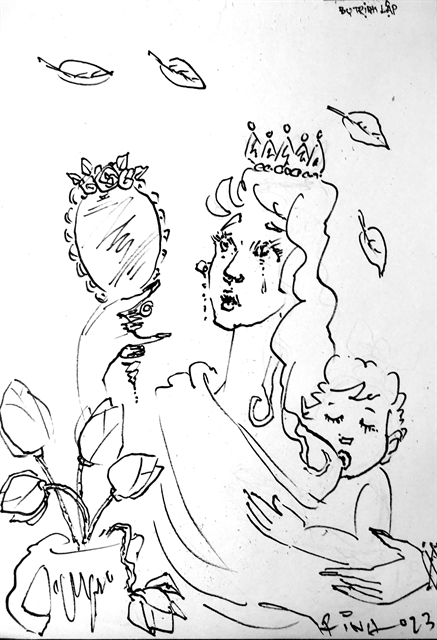
Illustration by Trịnh Lập
By Nguyễn Diệp
Post-pregnancy body shaming is a pervasive issue that affects many new mothers, causing undue stress and anxiety during an already challenging time. Society often places unrealistic expectations on women to quickly "bounce back" to their pre-pregnancy bodies, leading to self-doubt and feelings of inadequacy.
It's time to change the narrative and embrace self-love and body positivity. In this discussion, we will explore the harmful effects of post-pregnancy body shaming, highlight the importance of self-acceptance, and provide practical tips to foster body positivity among new mums.
Understanding post-pregnancy body changes is the first important thing. Pregnancy and childbirth bring significant physical changes to a woman's body. These changes include weight gain, stretch marks, loose skin, and alterations in breast shape and size.
It's crucial to recognise that these transformations are natural and beautiful manifestations of the journey of motherhood.
Society's fixation on unrealistic post-partum body standards creates unnecessary pressure for new mothers. By understanding and accepting these changes, women can begin their journey towards self-love and body positivity.
The second important thing, recognising the harmful impact of body shaming is the first step in combating it. Body shaming, whether it comes from external sources or from within ourselves, has a profound impact on our self-esteem and overall well-being.
Post-pregnancy body shaming can have detrimental effects on a woman's mental and emotional well-being.
As new mothers, we may find ourselves scrutinising every stretch mark, every extra pound, and every imperfection, often forgetting the miraculous journey our bodies have undertaken. The pressure to conform to a certain body type not only undermines our self-worth, but also distracts us from the joys of motherhood.
Constant exposure to societal expectations and comparisons can lead to feelings of shame, self-consciousness, and a distorted self-image. These negative emotions may hinder bonding with the newborn, affect maternal mental health, and contribute to post-partum depression.
Therefore, new mums must prioritise self-love and acceptance as they navigate the post-pregnancy journey.
Embracing self-love is crucial for us to reclaim our bodies and learn to love them as they are, rather than succumbing to the pressures of society.
Self-love is not an indulgence, it is a necessity. We must recognise that our bodies have performed a miraculous feat, and they deserve our admiration, gratitude, and acceptance. Let us remind ourselves that our bodies are not simply vessels for social approval but powerful instruments of nurturing, love and strength.
This involves reframing their mindset and focusing on the incredible accomplishments of their bodies, which have brought life into this world.
Engaging in positive self-talk, practising self-care, and seeking support from loved ones and professionals are essential components of this process. By shifting the focus from societal expectations to personal well-being, new mums can cultivate self-love and acceptance.
Next, let’s promote body positivity as a movement. In recent years, the body positivity movement has gained momentum, aiming to challenge society's narrow beauty standards and celebrate all bodies, regardless of shape, size, or appearance.
New mums can actively promote body positivity by embracing diversity and challenging societal norms. Engaging in positive body conversations, both online and offline, and sharing their own stories can create a supportive environment for other women.
By focusing on the functionality and strength of their bodies rather than external appearance, new mums can inspire others and foster a culture of body acceptance that embraces diversity and recognises the beauty in the post-pregnancy body, with its soft curves, scars, and marks, as a testament to the extraordinary journey of motherhood.
Besides this, new mums should surround themselves with positivity, and supportive individuals who celebrate your journey and reinforce positive body image, as well as engage in activities that make you feel good, such as exercise, meditation, or hobbies that promote self-esteem and well-being.
They should learn about the realities of post-pregnancy bodies and challenge societal myths and expectations, celebrate small victories, and acknowledge and celebrate the small milestones in your post-partum journey, such as increased strength or improved body confidence.
If body image concerns persist or affect your mental health, consider reaching out to healthcare professionals, therapists, or support groups specialising in post-partum issues.
Post-pregnancy body shaming is a societal issue that demands our attention and action. By embracing self-love, accepting our bodies' transformations, and promoting body positivity, new mums can reclaim their sense of self-worth and inspire others to do the same. Let us support each other in this journey, fostering a culture that celebrates the beauty and strength of all bodies.
Together, we can stop post-pregnancy body shaming and a supportive environment that uplifts and empowers new mothers, allowing them to focus on their own well-being and the joy of raising their children.
My dear new mums, it is time to break free from the cycle of self-criticism, challenge societal beauty standards, and foster a culture of acceptance and self-care. Remember, you are more than your physical appearance. You are a mother, a nurturer, and an embodiment of love. Embrace your journey, cherish your body, and let your light shine for all to see. — VNS
OVietnam